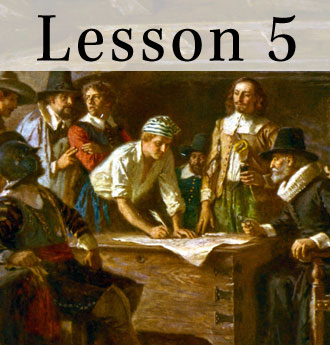Lesson 5: What Basic Ideas about Rights and Constitutional Government Did Colonial Americans Hold?
Biographies
Franklin, Benjamin (1706-1790) Franklin was the oldest delegate to the Philadelphia Convention. With the possible exception of George Washington, Franklin was the best-known man in America. Born into a poor family, Franklin became an inventor, scientist, diplomat, and publisher. His
Poor Richard's Almanac was read nationwide. His career in public service was long and varied, and included service as ambassador to England and France and as governor of Pennsylvania. At the Philadelphia Convention, Franklin was a compromiser, using wit to bring delegates together. A staunch advocate of colonial rights, he helped draft the Declaration of Independence and the Treaty of Paris (1783). He played an important role in creating the Great Compromise. He favored a strong national government and argued that the Framers should trust the judgment of the people. Although he was in poor health in 1787, he missed few sessions, being carried to and from the meeting place in a special chair. Although he did not agree with everything in the Constitution, he believed that no other convention could come up with a better document.
Hamilton, Alexander (1755-1804) Hamilton was a senior aide-de-camp to General Washington and an artillery captain during the Revolutionary War. He was a delegate from New York to the Philadelphia Convention and one of three authors of The Federalist, written to urge ratification of the U.S. Constitution. He later served as the first secretary of the treasury, put the nation's finances on a firm footing and advocated a strong national government.
James I (1566-1625) King of Scots (1567-1625). King of England (1603-1625). James was son of Mary, Queen of Scots. He sought to assert the divine right of kings.
Paine, Thomas (1737-1809) Author and political theorist. Born in England, he came to America in November, 1774. In early 1776, he published the pamphlet Common Sense which stirred many Americans to the revolutionary cause. During the war, his pamphlet, The Crisis, helped support the Revolution and encouraged the soldiers in the Continental Army.






